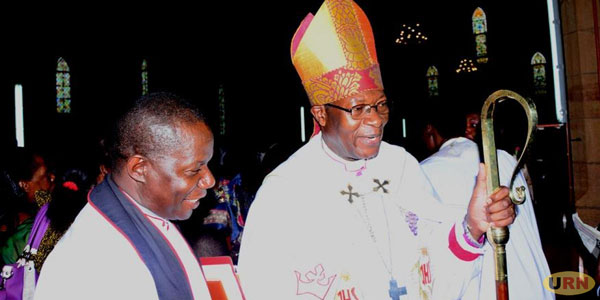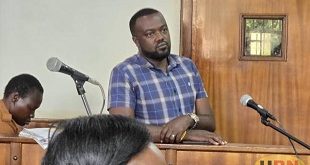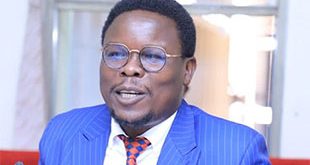
Kampala, Uganda | THE INDEPENDENT | In a turn of events, the House of Bishops of the Church of Uganda has decided to defer the election of the next Bishop of Namirembe Diocese after a petition was recieved at the last minute. The postponement comes with an announcement that the nomination process is still ongoing and, as such, a final decision has not yet been reached.
This has been confirmed by the Church of Uganda provincial spokesperson Adams Sadik saying that soon the House of Bishops will write to the nominations committee to give it further guidance on how the process will be handled going forward.
The House of Bishops convened Wednesday, with the expectation that they would use this session to elect the bishops for the Diocese of East Busoga and Namirembe, among addressing other matters on their agenda.
On the eve of the meeting, a group of elders took action by petitioning Archbishop Stephen Kaziimba Mugalu of the Church of Uganda.
Their complaint centered around concerns related to the handling of the nomination process for the next Bishop of Namirembe Diocese, citing allegations of corruption, conflicts of interest, and perceived unfairness in the selection process that resulted in the nomination of two candidates.
During the interview, the Provincial spokesperson did not explicitly confirm that the petition from the elders directly led to the deferment of the bishop election. Instead, he mentioned that “there are matters that forced the House of Bishops” to make this decision.
He further explained that the specific reasons for this action taken by the top leadership of the Church of Uganda would be communicated in detail to the nominating committee at a later time.
The election of the new bishop comes at a crucial juncture, as Bishop Wilberforce Kityo Luwalira, who has led Namirembe Diocese for the past 13 years, is approaching his canonical retirement age of 65. To ensure a smooth transition, the process of selecting a new bishop began on May 13th when the Namirembe Diocesan Synod meeting elected the Bishop’s nomination team.
This team has the responsibility of nominating two eligible priests, from whom the House of Bishops will ultimately choose the sixth Bishop of the oldest diocese in Uganda. This committee, chaired by Fred Mpanga, the chancellor of Namirembe Diocese, was tasked with identifying suitable candidates for the position of bishop and is said to have received 13 candidates.
Among those nominated were Rev. Canon Moses Kayimba (aged 50), Ven. Rev. Canon Moses Banja (aged 59), Rev. Edward Stephen Kabanda (aged 53), Ven. Canon John Gitta Kavuma (aged 58), and Ven. BK Buwembo (aged 50). Additional candidates included Rev. Semei Ssebina Sekiziyivu (aged 55), Rev. Emmanuel Lutaaya (aged 58), Rev. Dr. Thomas Timothy Nsubuga (aged 59), Rev. Esau Bbosa Kimanje, and Rev. Dr. Enock Kimanje.
Last week, the Synod convened at King’s College Budo to make the final decision on which two names to submit to the House of Bishops. However, reports indicate that disagreements arose during the Saturday meeting attended by 13 out of the 15 members. Ten of those in attendance are said to have expressed objections to the process contending that there were candidates on the list who had not undergone the requisite vetting and election procedures.
The Synod meeting on that day concluded amidst heated arguments, and a scheduled follow-up session on Monday did not take place. Nonetheless, it was reported that two names were eventually forwarded to the House of Bishops.
Who Qqualifies to be a Bishop in COU?
In accordance with Section 3.7.22 of the Provincial Canons of the Church of Uganda, eligibility for nomination to the position of bishop entails specific criteria. Prospective candidates are required to be ordained priests with a minimum of ten years of practical experience in pastoral ministry, as well as being at least 45 years old. The section further stipulates that an individual seeking nomination must hold a bachelor’s degree in Theology or Divinity and, alternatively, possess a first degree in another field supplemented by a postgraduate diploma in Theology or Divinity.
The canons elaborate that the nomination committee’s assessment of candidates will consider various factors, including their age, academic qualifications, pastoral ministry experience, spiritual dedication and testimony, family life, personal integrity, and societal standing.
Escalating tensions
In recent years, the Church of Uganda has found itself entangled in controversies surrounding the selection of bishops. This issue has resulted in significant divisions within the church across various dioceses, with factions of Christians rejecting both the nominated candidates and the ultimately elected bishops.
Such situations have arisen in places like Kumi, Muhabura Diocese, and most recently in Luweero, where conflicts remain unresolved. Notably, in some instances, disgruntled Christians have resorted to legal action in civil courts, a practice that church authorities have criticized.
In 2019, Charles Okunya was elected as the second bishop of Kumi Diocese, only for Archbishop Stanley Ntagali to revoke the appointment in February 2020 due to alleged age falsification.
Earlier this year, the House of Bishops elected Godfrey Kasana Ssemakula as the Bishop of Luweero Diocese but later disqualified him on the grounds of maintaining relationships with two mistresses and having children with them. Therefore, it remains uncertain whether the Namirembe nomination committee will be able to navigate this process without stirring up controversy.
The origins of these conflicts in bishop elections can be traced back to the 1965 election of Bishop Erica Sabiti as the Archbishop of Uganda. In his doctoral thesis, Dr David Zac Niringiye, retired assistant bishop of the diocese of Kampala, highlighted the existence of a laymen’s advocacy group within the church known as the Namirembe Christian Organization, which pushed for the new archbishop to have Muganda heritage.
Namirembe Diocese and Luwalira’s Legacy
Since its establishment in 1960, Namirembe Diocese has had a total of five bishops. The first bishop was Leslie Brown, who served for a five-year tenure. Following him was Dunstan Nsubuga, who became the first indigenous bishop and served for a decade. In 1985, Bishop Kauma succeeded him and led the diocese for nine years.
Subsequently, Samuel Ssekkadde assumed leadership and served as bishop for a remarkable 15-year period. He eventually passed the baton to Luwalira in 2009. During his tenure as Bishop, Luwalira has overseen several significant developments in the diocese. This includes the establishment of Namirembe FM, an Anglican Christian radio station, the renovation of Namirembe Cathedral through the ‘Project Ttegula,’ which raised 2.3 billion Shillings, as well as the construction of the Mission House, Mothers Union Building, Bawereza House, and numerous other church-related projects within the diocese.
Namirembe Cathedral, commonly known as St. Paul’s Cathedral Namirembe, holds a prestigious status as the oldest cathedral in Uganda. It serves a dual role as the provincial cathedral of the Anglican Church of Uganda and the diocesan cathedral for Namirembe Diocese, which was established in the year 1890.
***
URN
 The Independent Uganda: You get the Truth we Pay the Price
The Independent Uganda: You get the Truth we Pay the Price



